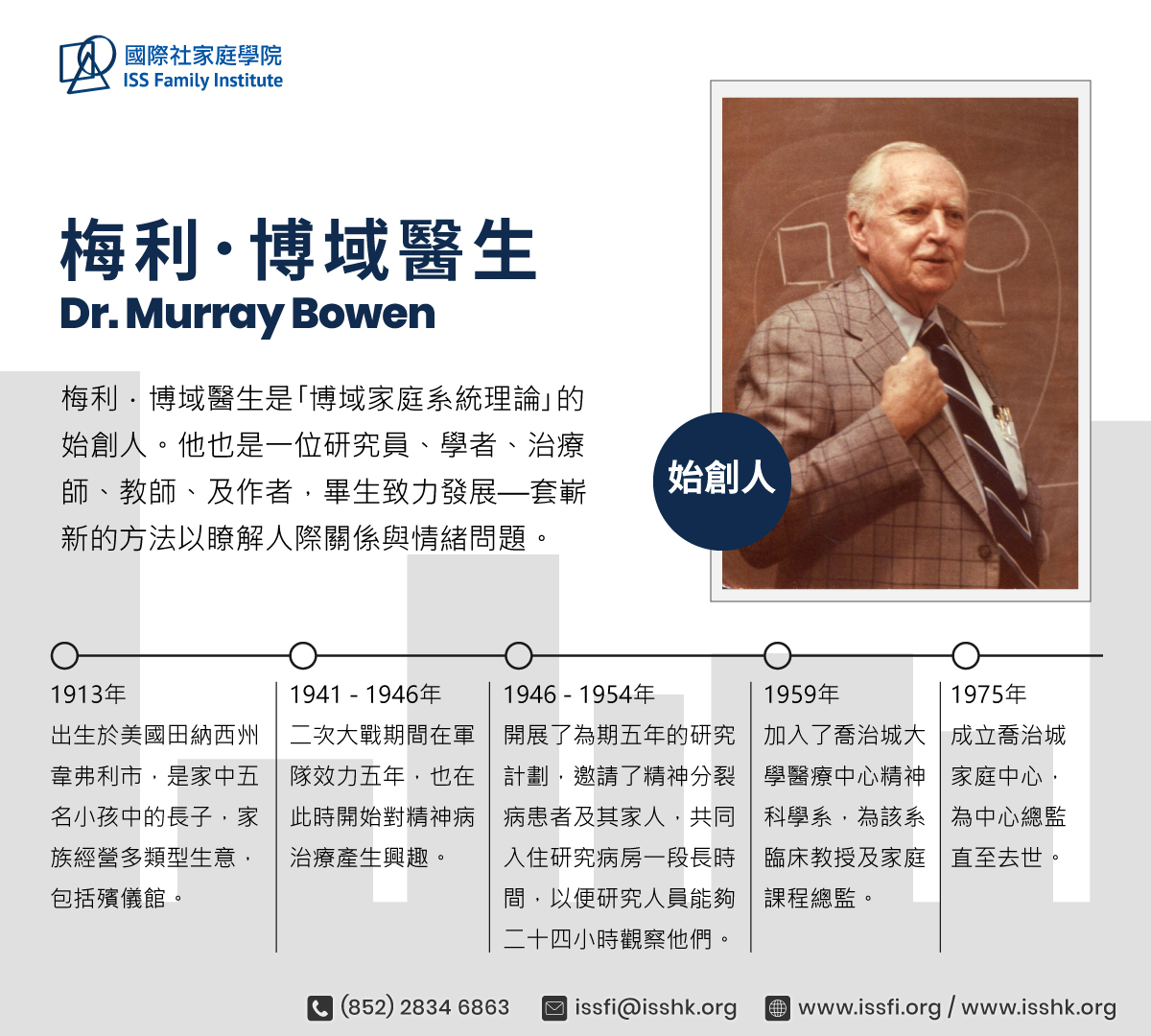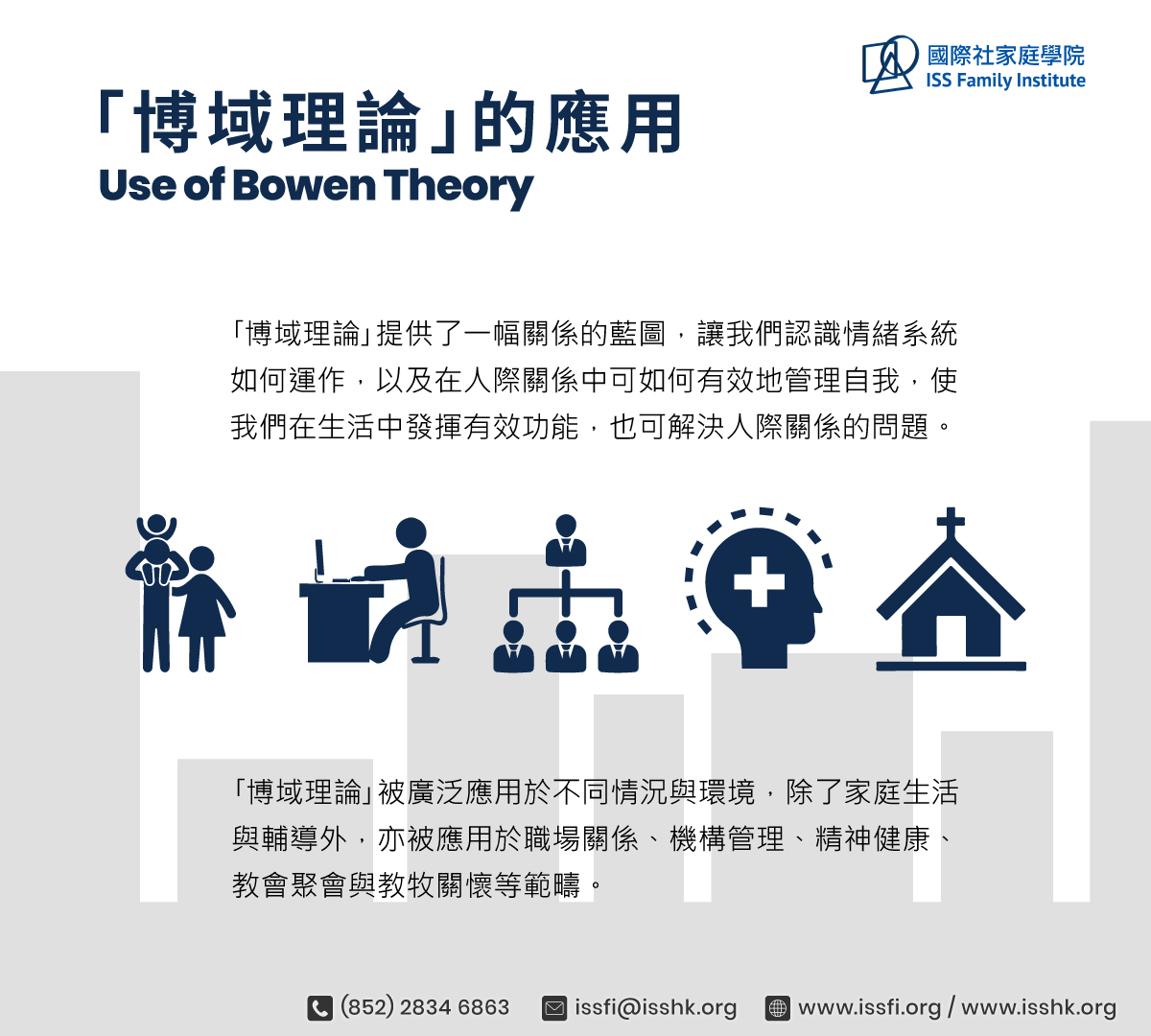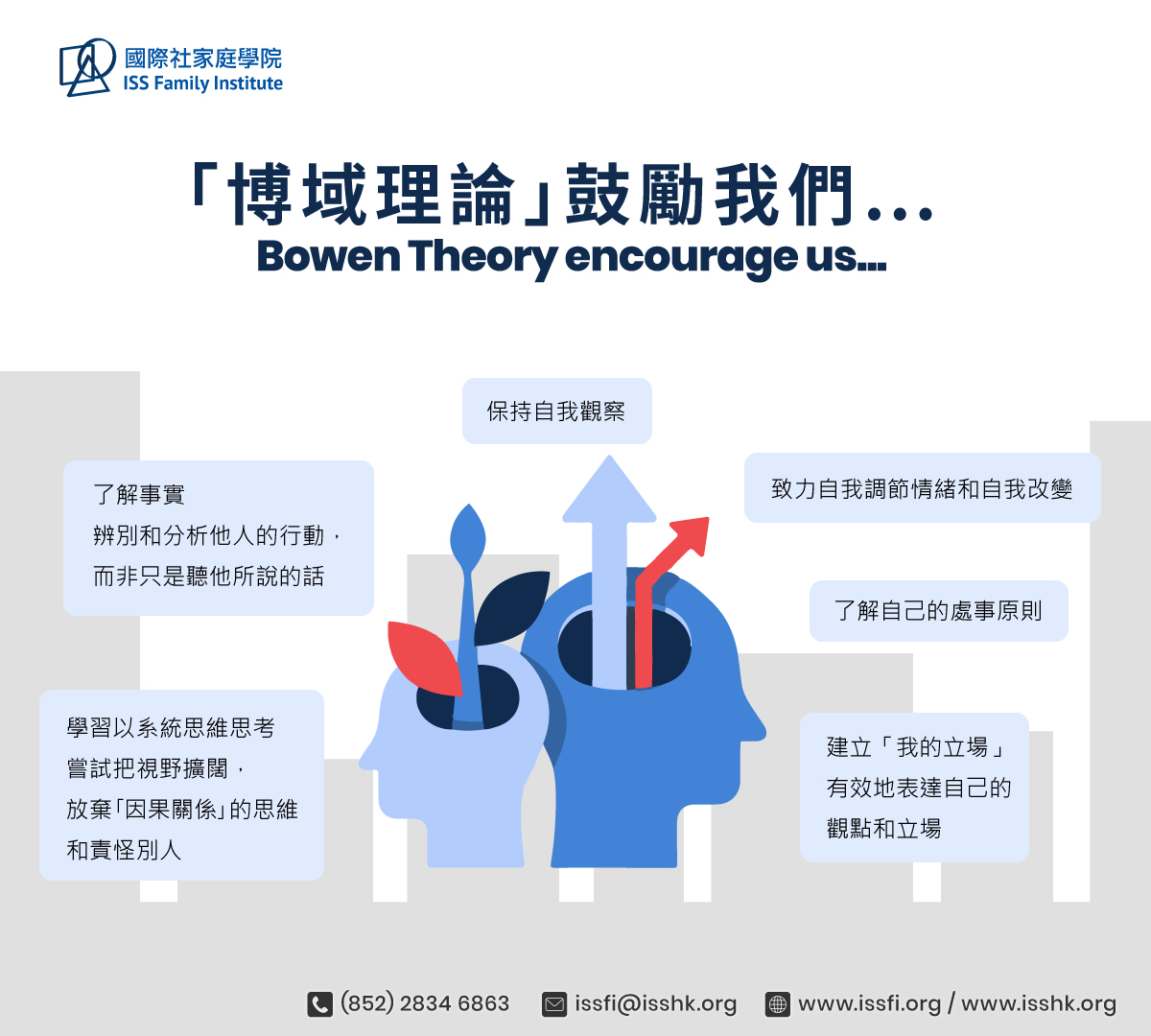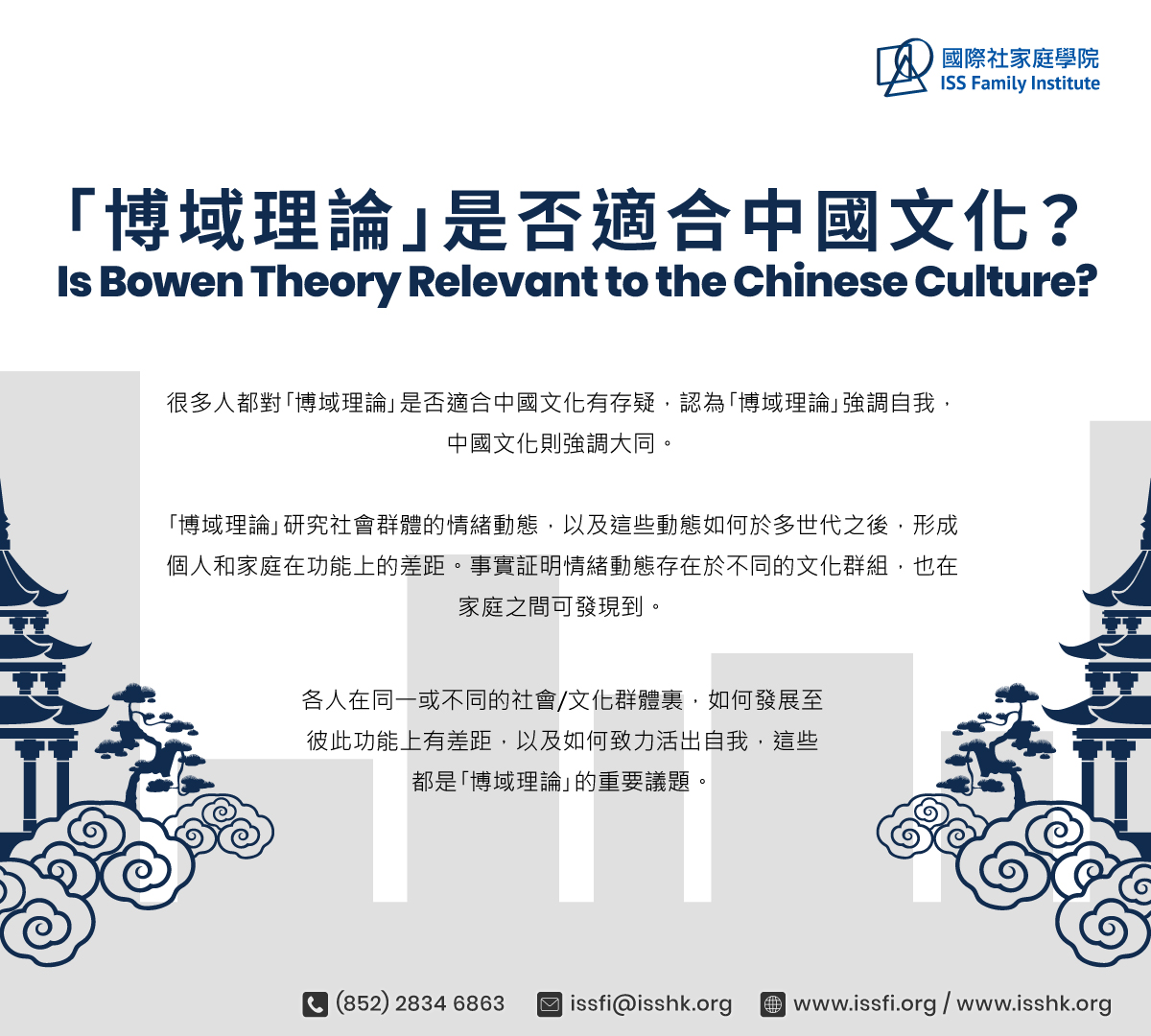Dr. Murray Bowen
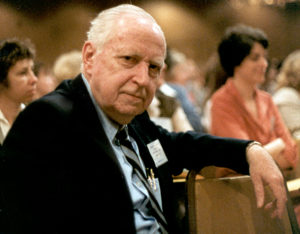
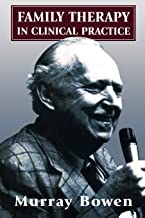
Dr. Murray Bowen was the originator of Bowen family systems theory. He was a researcher, scholar, clinician, teacher and writer, who had worked diligently towards developing a new way of understanding human relationships and problems, at a time when the Freudian theory and the view of emotional and behavioral problems as arising from individual pathology were the predominant mode of understanding and treating human problems.
Dr. Bowen was born in Waverly, Tennessee in 1913 where his family ran a variety of family businesses including a funeral parlour and was a well-established family in the small town. Dr. Bowen was the eldest child of five children. His early days of helping in the farm had made him keenly aware of the impact of nature on living organisms, and their adaptations to each other. He received his medical training at the University of Tennessee Medical School. After his medical training, he served five years of active duty with the Army during World War II, 1941-46, whereby he began to develop an interest in psychiatry.
He began his psychiatric training at the Menninger Foundation in Topeka, Kansas in 1946 until 1954. He then changed to the National Institute of Mental Health (NIMH) in Bethesda, Maryland where he pioneered a five-year research project. The research project involved placing families with an adult schizophrenic child in the research ward for long periods of time so that they can be observed by the staff on a 24 hour basis. This research rendered many valuable ideas for Dr. Bowen in the formulation of his theory. In 1959 he left NIMH to join the Department of Psychiatry at Georgetown University Medical Center, and became a Clinical Professor, and Director of Family Programs. In 1975 He founded the Georgetown Family Center and was its director until his death. Dr. Bowen was well-recognized for his contributions in the study of human behavior and therapy. He received numerous awards for his contributions, including Alumnus of the Year by the Menninger Foundation in 1985, and the Distinguished Alumnus Award from the University of Tennessee-Knoxville in 1986.
Dr. Bowen had studied a wide spectrum of disciplines especially evolutionary biology, as he developed his theory. His vision is to develop the theory into a science of human behavior.
Bowen Family Systems Theory
Bowen family systems theory is a theory of human behaviour developed by the late American psychiatrist Dr. Murray Bowen (1913-1990). It provides a paradigm for conceptualization of human behaviour and treatment of human problems. It is a theory about relationships. Instead of seeing individuals as an emotional unit of his own, or as a separate entity, and the individual as the basic unit of treatment, Bowen deemed that individual functioning should be understood in the context of his relationships, that each person’s emotional functioning is closely interconnected with each other, with reciprocal impact on each other.
The theory is developed out of Dr. Bowen’s extensive study on biology, evolution, natural sciences and his own research on families. He sees the human family as a natural living system, and that the human is regulated by natural processes that are also found operating in other living organisms. Bowen family systems theory offers a unique framework for understanding health and variation of functioning in families and individuals, as well as strategies for promoting resilience and flexibility.
Linkage with the natural sciences
Four Foundation Concepts
1 Anxiety
2 Two Basic Life Forces
3 Emotional System
4 The Family as an Emotional Unit

Eight Emotional Processes
- Differentiation of Self
- Triangling
- Nuclear Family Emotional Processes
- Reactive Distance
- Marital Conflict
- Reciprocal Functioning
- Projection of Problem onto a Child
- Family Projection Process
- Multigenerational Transmission Process
- Sibling Position
- Emotional Cutoff
- Societal Emotional Processes
Development of Symptoms
When anxiety is high, the emotional interdependence drives people to trade “selves” or form fused relationships. One member will be especially vulnerable to the tension, absorb the anxiety, and give up self in order to obtain people’s attention, or approval. This individual will subsequently manifest problems such as alcoholism, depression, acting out behaviours and various forms of emotional dysfunction.
A Systemic Way of Looking at Relationships
Bowen advocated a systemic way of looking at relationships, ie. instead of seeing relationships in a linear way as cause and effect (the aggressor and the victim), we should look at the reciprocal influence of behaviours on each other, how we are both the cause and effect of the interactional chain. This way of seeing relationships does away with blame and accusation; instead it highlights attention to the part each of us play in the interaction. It helps us to look at the contribution of each of us in our transactions with others, focusing on our own responsibilities, and self-change.
A Broad View of the Situation
To effect change, Bowen deemed that it is useful to identify the patterns that families developed to cope with anxiety over the different generations, and not just focus on the identified patient. Intervention strategies can then be developed. A family diagram is a useful tool to gather information of the family over at least 3 generations, eg. about relationship patterns, family composition and structure, individual and family functioning, and significant events over the generations.
Click HERE to download PDF.
Use of Bowen Family Systems Theory
The Bowen theory provides a comprehensive conceptual framework for understanding human behavior and relationships. It also offers a blue print to lead a functional life and solve problems in our relationships, through knowledge of how the emotional system operates, and managing self effectively in our relationship systems. The theory has been applied to a wide variety of situations and settings such as work-place relationships, organizational management, mental health, church congregations and pastoral care, besides family life and counselling.
According to the Bowen theory, we can enhance our individual and group functioning through each person working on the following:
| ✔ | Having a self-observational stance |
| ✔ | Working on emotional self-regulation and self-change |
| ✔ | Learning the facts – identifying what the person’s doing instead of what he is saying |
| ✔ | Learning to ‘think systems’ – seeing the big picture, letting go of the ‘cause and effect’ thinking and blaming others |
| ✔ | Knowing one’s principles |
| ✔ | Developing the ‘I-position’ – expressing one’s standpoint effectively |
Is Bowen Theory Relevant to the Chinese Culture?
There have often been concerns about the relevance of Bowen theory to the Chinese culture, as proponents think that the Bowen theory emphasizes the self, while Chinese culture emphasizes collectivistic well being.
Bowen theory studies the emotional processes of social groups, and how these emotional processes give rise to variations of functioning in individuals and families across generations. It is found that these emotional processes are evident in different cultural groups, and amongst families. Individuals within Chinese families also have different functioning, e.g. a family emphatic on promoting filial piety will likely find different functioning in its children. The eldest son may dutifully carry out the wishes of the parents in a uncompromising and rigid manner, and neglect his own needs. The youngest son may act rebelliously towards the expectations and demands of the parents. The middle son may show more flexibility in practicing filial piety by being able to honour his parents’ needs while also taking care of his own needs and acting in accordance with his principles. How individuals vary in their functioning within the same social/cultural group and amongst different groups, and be a self, is the subject of interest in Bowen theory.

